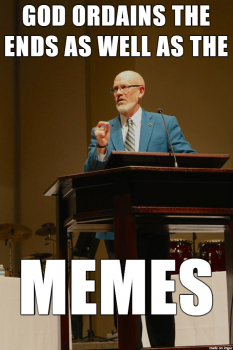"justbyfaith,
Hello JBF,
First I want to thank you for having the integrity to stand up and offer your understanding for interaction. I will do my best to close the gap where we might differ as some of the brothers have already started doing.;)
here is your posts:
[you can start with Limited Atonement.]
okay, let's look together
[Does that not teach that Christ did not die for everyone,]
Correct. Jesus died a Covenant death for all the Father gave to Him.
Keep in mind that everyone limits the atonement. For example Jesus did not die for fallen angels, and not every person is going to be saved.
[but only for a select few?]
No Jesus dies for a multitude that no man can number: gen13
15 For all the land which thou seest, to thee will I give it, and to thy seed for ever.
16 And I will make thy seed as the dust of the earth: so that if a man can number the dust of the earth, then shall thy seed also be numbered.
This does not seem to be a select few, does it?
[If He did not die for you, then does that not mean that if you call on the name of the Lord, you will not be saved; because He didn't die for you?]
Why worry about something that will never happen? Everyone believing will be saved! God is not surprised when a person believes on Him. There is no such thing as an unbeliever who believes without the Spirit giving a new heart.
[Even if you have an answer for this, I would contend that a lot of confusion could be avoided by not teaching the source of the confusion in the first place.]
When the doctrines of grace are preached by a pastor who believes and understands the teaching it is remarkably clear.
My view of foreknowledge is the biblical one; that God chose us before the foundation of the world according to His foreknowledge of whether we would receive or reject Christ.
Sorry this is 100% wrong.
consider this; From A Baptist Catechism with Commentary, by WR.Downing
There are two possible bases or foundations for Divine election: foreseen
faith based on a bare foreknowledge [prescience], or a covenant love
grounded in the Divine prerogative and expressed in free and sovereign grace.
The Scriptures reveal that the ultimate cause of Divine election rests in the
depths of Divine love and prerogative. God is never moved or motivated
externally to himself. He is ever motivated from within his own self–
consistency. Should he be mutable due to external causes, he would cease to
be God, and be relative to his creation and subject to some nebulous, external
absolute force such as chance or some impersonal fatalistic principle. The
Scriptures reveal that the Divine choice of sinners to salvation rests in God
alone. This is for the assurance and encouragement of the believer in his
present experience—that he might be assured of the certain and infallible
nature of his salvation, especially in the context of present trials and
opposition (Deut. 4:37; 7:6–7; 10:14–15; Eph. 1:4–5; Rom. 8:28–39; 9:13–
14; 11:33–36).
What of foreknowledge? Divine election based on foreseen faith would be
election by mere foreknowledge [prescience]. The biblical usage must
determine the exact significance of the term. What is the biblical teaching
concerning the foreknowledge of God? Foreknowledge is not synonymous
with omniscience. It is concerned, not with contingency, but with certainty
(Acts 2:23; 15:18; Rom. 8:29–30), and thus implies a knowledge of what has
been rendered certain. Acts 2:23 would make foreknowledge dependent upon
God’s “determinate counsel” by the grammatical construction which
combines both together as one thought with “foreknowledge” referring to and
enforcing the previous term. Foreknowledge is related to the Old Testament
term “to know,” implying an intimate knowledge of and relation to its object
(Cf. Gen. 4:1; Amos 3:2). The passages in the New Testament (Rom. 8:29;
11:2; 1 Pet. 1:2) all speak of persons who are foreknown, implying much
more than mere prescience or omniscience—a relationship that is absolutely
certain, personal and intimate. The only example of things being foreknown is
clearly based on Divine determination (Acts 15:18).
Because Divine election or foreordination to eternal life is grounded in the
immutable character of God, it is infallible. Were it based upon foreseen faith,
mere prescience, or human ability, it would remain fallible and mutable.
Because of its infallible and immutable character, Divine election or
foreordination to eternal life is the source of the greatest comfort,
125
encouragement and perseverance to the believer. This is exactly the way in
which and the reason why this truth is revealed in Scripture! Note especially
the great and glorious statement of the Apostle in Romans 8:28–39. Under
inspiration, he puts this truth in the context of the present promise (v. 28), the
eternal redemptive purpose (v. 29–34), the very worst that believers can
experience (v. 35–36), the redemptive, covenant love of the Lord Jesus Christ
(v. 37) and the infallibility of the Covenant of Grace (v. 38–39).
God has ordained the preaching of the gospel as the means to bring the
elect to faith in Christ in time and experience (Rom. 10:14–15, 17; 1 Thess.
1:4–10; 2:13). He has ordained the means as well as the end. To glory in the
end without fulfilling the means would be inconsistent and sinful by
disobedience. See Questions 139–140. Can you say that you are included in
this number by Divine grace?
[However, in Calvinism, it is by a predetermined choice of God; and foreknowledge of whether we receive or reject Christ has nothing to do with it.]
A correct view of foreknowledge solves most of this supposed confusion
;)




